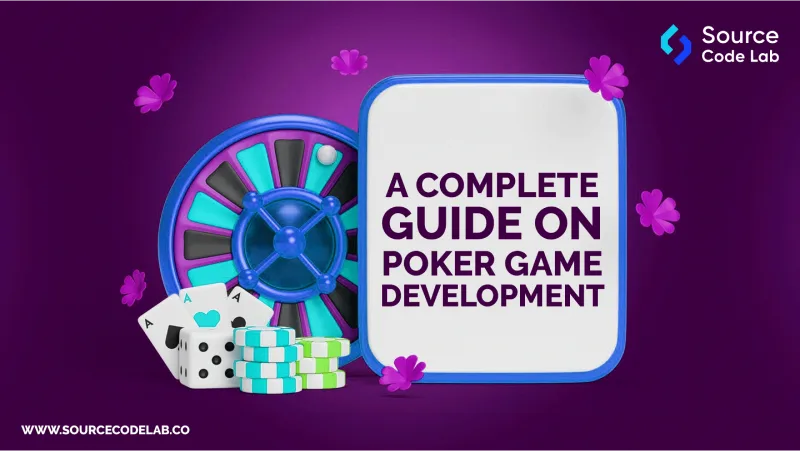Quick Summary
Online poker stands out among other casino games due to its legal status and regulation in numerous countries, with particular popularity in the United Kingdom. While it offers various variations, the core gameplay remains consistent. In this detailed guide, we delve into Poker Game Development, examining the development process, essential features, cost factors, and the myriad advantages of crafting poker games for the digital domain.
Introduction
The Poker Game has been a popular pastime for generations, offering both professional players and amateurs the chance to win big. Considered one of the best casino games, poker has evolved from physical tables to mobile devices and computers thanks to the world of Poker Game Development Company. In this comprehensive guide, we’ll explore the ins and outs of Poker Game Development, covering the development process, key features, cost considerations, and the numerous benefits of creating poker games in the digital realm.
The Fascination of Poker
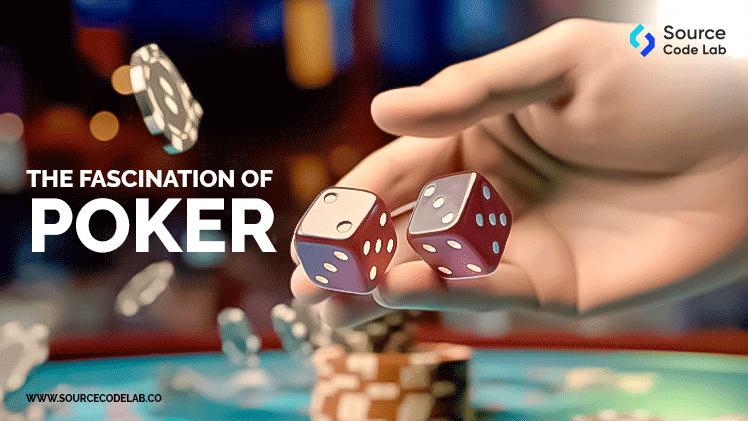
Poker transcends being just a card game; it stands as a global phenomenon, steeped in history and boasting a massive following. Here’s a closer look at why poker continues to enthrall players worldwide:
Skill and Strategy:
Poker is not merely a game of chance; it’s a test of skill and strategy. Players must meticulously analyze situations, make calculated decisions, and adeptly read their opponents’ moves to gain an edge.
Social Interaction:
Beyond the cards and chips, poker fosters social interaction and camaraderie. Whether played among friends or strangers, the game provides a platform for meaningful connections and shared experiences.
Varied Formats:
Poker offers a diverse range of formats to cater to different player preferences. From the intense showdowns of Texas Hold’em to the strategic complexities of Omaha and the classic allure of Seven Card Stud, there’s a variant for every taste.
Competitive Thrill:
The competitive element inherent in poker adds an exhilarating dimension to the game. The quest for victory fuels players’ determination to outwit their opponents, continuously honing their skills in pursuit of success.
Accessibility:
With the advent of digital poker games, access to the thrill of poker has never been easier. Players can indulge in their passion for the game anytime, anywhere, with online platforms offering seamless gameplay across devices.
Tournaments and Events:
Poker tournaments and events stand as grand spectacles, drawing enthusiasts from around the globe. These high-stakes competitions provide players with the ultimate stage to showcase their skills, vie for prestigious titles, and vie for substantial cash prizes. In essence, the fascination of poker lies in its blend of strategic depth, social dynamics, and the adrenaline rush of competition, making it a timeless pursuit for players of all backgrounds and levels of expertise. The evolution of digital platforms through Poker Game Development has further amplified its reach, ensuring its enduring popularity in the digital age.
Understanding Poker Game Development
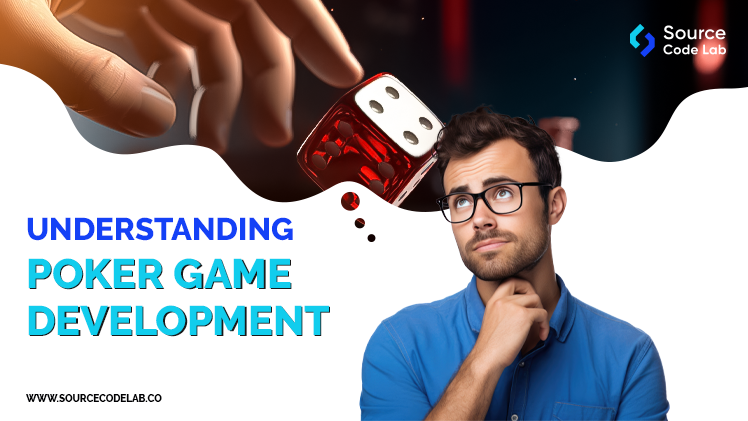
Poker game development is the process of creating digital versions of poker games that can be enjoyed on various platforms, including mobile devices and desktop computers. This involves a series of steps aimed at designing, building, and launching a poker game that delivers an engaging and immersive experience for players. Here’s a detailed overview of the key stages involved in poker game development:
Concept and Design:
- The development process begins with conceptualizing the poker game and selecting the specific variant of poker to be implemented.
- Game designers outline the rules and mechanics of the game, including the gameplay flow, user interactions, and visual aesthetics.
- A comprehensive game design document is created, detailing all aspects of the game, such as the user interface (UI) design, game mechanics, and audiovisual elements.
Technology Stack:
- The development team selects the appropriate technology stack for building the poker game, including programming languages, frameworks, and game engines.
- Consideration is given to platform compatibility, ensuring that the game can be deployed across multiple devices and operating systems seamlessly.
Graphics and Animation:
- Graphic designers create visually appealing game assets, including card designs, player avatars, and table layouts.
- Animations are incorporated to enhance the gaming experience, including animations for card shuffling, dealing, and player actions.
Multiplayer Functionality:
- Multiplayer features are implemented to allow players to join online tables and compete against each other in real time.
- Secure server infrastructure is established to manage gameplay sessions, handle player interactions, and ensure fair gameplay.
User Interface (UI):
- The UI design focuses on creating an intuitive and user-friendly interface, with features such as betting controls, chat functionality, and player statistics.
- UI elements are optimized for various screen sizes and resolutions to provide a consistent experience across different devices.
Monetization Strategies:
- Monetization strategies are planned to generate revenue from the game, including in-game purchases, virtual currency systems, and advertisements.
- Premium features or subscription plans may be offered to players as additional revenue streams.
Testing and Quality Assurance:
- Rigorous testing is conducted to identify and resolve any bugs, glitches, or gameplay issues that may impact the player experience.
- Game performance is optimized to ensure smooth gameplay and responsiveness across different devices and network conditions.
Regulatory Compliance:
- Compliance with relevant gambling regulations and age restrictions is ensured, particularly if the game involves real money gambling or in-app purchases.
- Measures are taken to protect player privacy and data security in accordance with industry standards and regulations.
Launch and Marketing:
- The game is launched on various app stores and gaming platforms, following submission guidelines and approval processes.
- A comprehensive marketing strategy is developed to promote the game, including social media campaigns, influencer partnerships, and targeted advertising efforts.
Updates and Support:
- Regular updates and patches are released to introduce new features, address player feedback, and improve the overall gameplay experience.
- Customer support services are provided to address player inquiries, technical issues, and gameplay-related concerns, ensuring a positive and engaging experience for all players.
In summary, poker game development is a multifaceted process that involves careful planning, creative design, technical implementation, and ongoing maintenance to create a successful and enjoyable gaming experience for players worldwide. This comprehensive approach ensures a top-notch Poker Game Development Solution that caters to the diverse needs and preferences of players across the globe.
Also Read: Top 10 Game Development Companies in 2024
Features of a Successful Poker Game

Creating a successful poker game necessitates integrating essential features that elevate the player experience. Here’s an in-depth look at the key components to consider:
Poker Variants:
Provide a diverse array of list poker variants, including popular choices like Texas Hold’em, Omaha, and Seven Card Stud, catering to the diverse preferences of players.
Multiplayer Mode:
Enable robust multiplayer functionality, allowing players to engage in real-time competition against others from around the world, fostering a dynamic and interactive gaming environment.
Player Profiles:
Empower players to personalize their gaming experience by creating profiles, customizing avatars, and tracking their statistics and achievements over time, enhancing engagement and immersion.
In-Game Chat:
Implement a comprehensive in-game chat system, facilitating social interaction and communication between players during gameplay, and fostering camaraderie and community building.
Tournaments and Events:
Organize frequent poker tournaments and events with varying buy-ins, prize pools, and formats, offering players exciting opportunities to test their skills, compete against others, and earn prestigious titles and rewards.
Training and Practice:
Offer dedicated training modes or AI opponents for novice players to learn the intricacies of the game, refine their strategies, and hone their skills in a supportive and non-competitive environment.
Realistic Graphics:
Utilize cutting-edge graphics and animations to create visually stunning and immersive poker table environments, enhancing the overall gaming experience and immersion for players.
Secure Transactions:
Prioritize the implementation of robust security measures to safeguard player data and ensure secure transactions for in-game purchases, virtual currency transactions, and other financial transactions, fostering trust and confidence among players.
Fair Gameplay:
Employ advanced and transparent card shuffling algorithms to guarantee fair and unbiased gameplay, maintaining game integrity and ensuring a level playing field for all participants.
Leaderboards:
Introduce dynamic leaderboards that highlight the top-performing players based on various metrics, such as winnings, tournament victories, and skill level, fostering healthy competition and motivation among players.
Monetization Options:
Provide a range of monetization options, including in-game currency, virtual items, and premium features, allowing players to customize their gaming experience and support ongoing development and maintenance efforts.
In essence, a successful poker game developed by a reputable Poker Game Development Company encompasses a rich array of features designed to deliver engaging, immersive, and rewarding experiences for players of all skill levels. These features ensure longevity, popularity, and profitability in the competitive gaming market, solidifying the game’s position as a top choice among players worldwide.
Costs of Poker Game Development
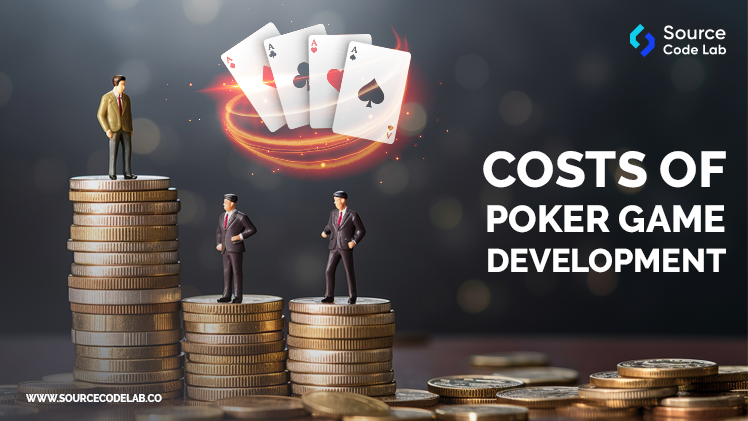
Your chosen monetization strategy, whether through in-app purchases, advertisements, or premium features, can influence revenue potential and development costs. On average, the development of a basic poker game featuring single-player and multiplayer modes may range from $10,000 to $100,000. More complex poker games with advanced features and realistic graphics could require budgets ranging from $100,000 to $500,000 or higher. Consulting with a reputable game development company offering Poker Game Development Services is essential for a precise cost estimate tailored to your project’s specific scope and requirements.
Also Read: How Much Does It Cost To Develop A Real Money Game?
Benefits of Poker Game Development
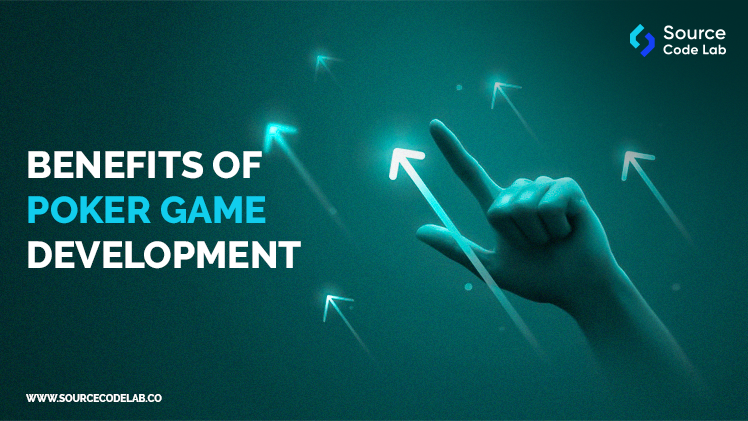
Poker Game Development brings numerous advantages for both developers and players alike:
Revenue Generation:
- Poker games offer avenues for substantial revenue generation through in-app purchases, advertisements, and premium features.
Player Engagement:
- These games maintain player interest, prompting frequent returns for tournaments, events, and ongoing gameplay.
Social Interaction:
- Multiplayer poker fosters social connections, allowing players to engage with friends and fellow enthusiasts.
Learning and Practice:
- Players can hone their poker skills in a risk-free environment, learning and practicing without real-money stakes.
Variety of Gameplay:
- Offering diverse poker variants and gameplay modes ensures players find their preferred style of play.
Brand Building:
- Successful poker games contribute to brand recognition and cultivate a loyal player base, fostering sustained success.
Global Reach:
- Poker games have a broad international appeal, attracting players from various regions worldwide.
Cross-Platform Play:
- Enabling cross-platform compatibility ensures accessibility across different devices, enhancing player engagement.
Monetization Flexibility:
- Developers can explore various monetization strategies to optimize revenue streams effectively.
Updates and Community:
- Regular updates and community involvement foster a vibrant player community, sustaining long-term interest and engagement.
Conclusion
In conclusion, the realm of Hire game developers offers abundant opportunities for gaming enthusiasts and entrepreneurs alike. Whether you’re driven by a profound passion for poker or aspire to make your mark in the gaming industry, embarking on a poker game development venture can be incredibly rewarding. To set sail on your poker game development journey, look no further than Source Code Lab. As a reputable mobile game development company, we specialize in crafting immersive and engaging gaming experiences. By partnering with us, you gain access to a team of skilled game developers well-versed in Poker Game Development Services. With our expertise, your project is guaranteed to surpass player expectations and unlock the full potential of the poker gaming experience. Choose Source Code Lab for a comprehensive Poker Game Development Solution that brings your vision to life. Let’s revolutionize the world of poker gaming together.
FAQs
What is Poker Game Development?
Poker game development involves the creation of digital versions of poker games that can be played on various platforms, including mobile devices and computers.
What are the key steps involved in Poker Game Development?
The key steps include concept and design, technology stack selection, game mechanics development, graphics and animation design, multiplayer functionality implementation, UI design, monetization strategy planning, testing and quality assurance, regulatory compliance, and launch and marketing.
What are some challenges in poker game development?
Challenges may include balancing gameplay mechanics, ensuring fair and secure online play, optimizing performance across different devices, adhering to legal and regulatory requirements, and competing with existing poker game offerings.
How can I ensure the success of my poker game?
To ensure success, focus on creating a high-quality game with engaging gameplay, appealing graphics, robust multiplayer functionality, effective monetization strategies, and thorough testing and optimization. Additionally, consider marketing your game effectively to reach your target audience.


